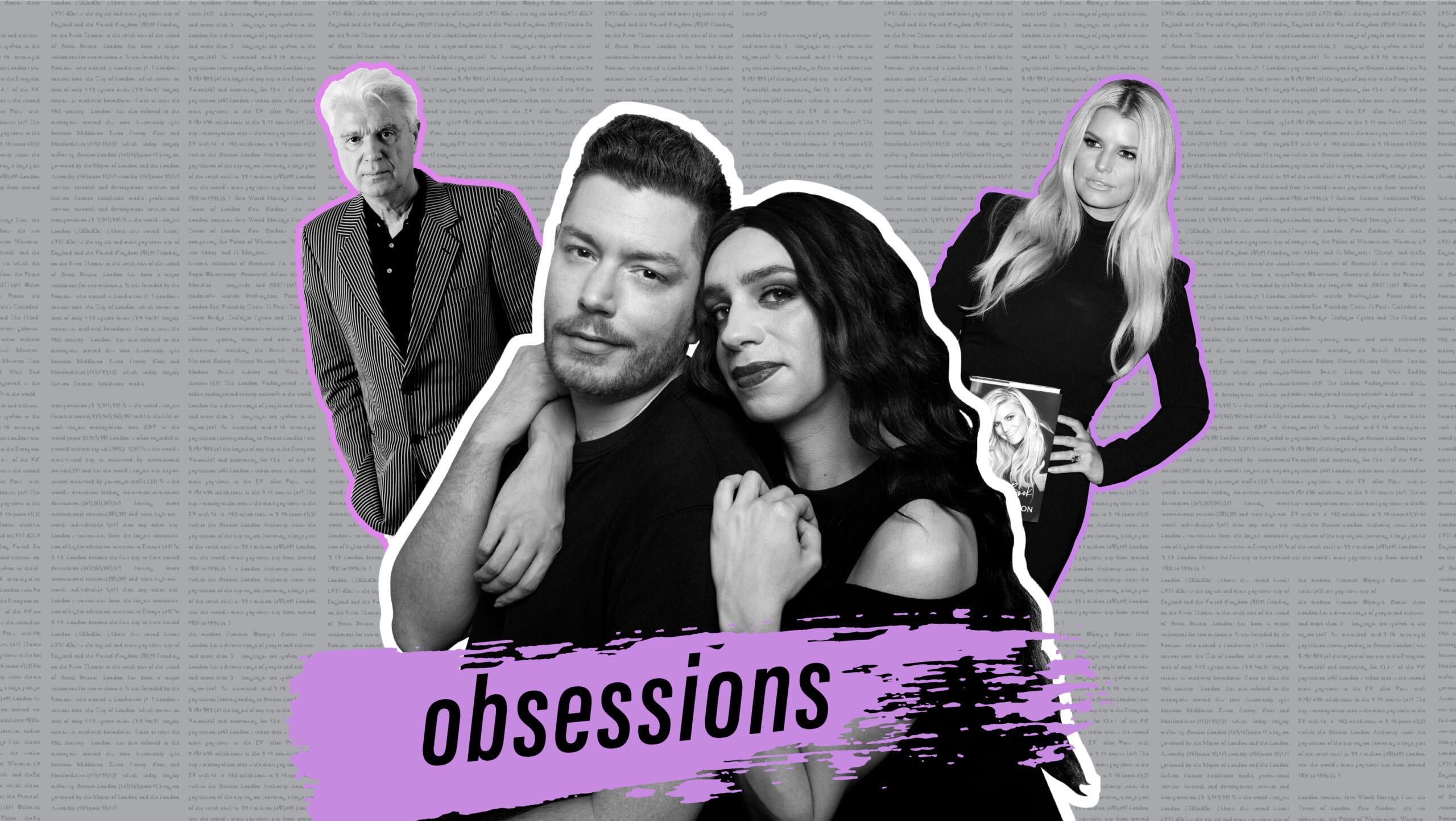Obsessions celebrates the pop culture fixations of queer, cosmically-destined BFFs Thomas Leblanc and Tranna Wintour, hosts of the CBC podcast Chosen Family.
A global outbreak, a pair of male septuagenarians battling for the U.S. presidency, no new Rihanna music yet in 2020: Is the current state of the world affecting your mental health?
For many, the best way to cope is to retreat into nostalgia and consume only music, film and television from previous decades. The 1990s and early 2000s seem like much simpler times—how else do you explain why people still binge Friends, even though it hasn’t aged well? I get it; facing uncertainty, we turn to things that stand the test of time, like Rachel’s haircut.
But the past and present are not always at odds. It’s possible to embrace what came before and still make great art now. This is what Talking Heads’ David Byrne has done with his American Utopia project.
The studio album, released in 2018, is rooted in our collective contradictions and doesn’t shy away from current politics. Byrne sings about not giving in to despair while acknowledging the absurdity of the human experience. In these difficult times, Byrne thrives on finding humour and joy.
Take the song “Everyday is a Miracle.” Byrne combines the Christian and pagan, singing that the “pope don’t mean shit to a dog,” before adding: “Every day is a miracle / Every day is an unpaid bill.” The themes on the album are as bold as the lyrics: The authoritarianism of the current occupant of the White House, the lethal toll of gun violence and the conformity of suburbia. On American Utopia, the American dream is turned upside down, but it doesn’t have to become a nightmare. Amen.
The 67-year-old artist just closed a run of American Utopia the dance-cum-multimedia concert that landed on Broadway after a successful tour. Byrne was also a musical guest on Saturday Night Live last month and the internet was right in remembering just how effortlessly cool he is.
I saw American Utopia at the Hudson Theatre a few months ago (the show is on hiatus until it begins again in the fall for a run timed with the election). It was one of the most joyful musical experiences of my life. On stage, Byrne is surrounded by 11 musicians who dance, run and jump to an incredible choreography by Annie-B Parson. It was fantastic to see my friend Chris Giarmo, a queer dancer and drag artist, paired with jazz songstress Tendayi Kuumba as Byrne’s back-up singers. The setlist is not your traditional pop musical: It features a few classic hits, new songs, some rarities and a cover of a Janelle Monáe protest song.
This is why I love David Byrne so much. The elder statesman of avant-pop could be content re-playing hits like “This Must Be the Place (Naive Melody)“ or “Burning Down the House.” But he’d rather use his catalogue to lure people into listening to new music inspired by the world we now inhabit. Byrne’s “utopia” favours human connection and togetherness.
Byrne is not queer in the sexual sense, but he strays from the pack in his own way. In recent years, he has embraced his difference by publicly speaking about living with Asperger’s syndrome, making him both more intelligent than average and socially awkward in groups.
Strange and quirky enough, he is a rare baby boomer adored by Generation X and millennials because he sings in earnest irony. And after the show, I was happy to see dozens of young people—some of them presenting as queer—waiting outside the theatre for an autograph from their hero.
In a way, Byrne is the Bernie Sanders of music. A consistent radical and outsider, he invites us to believe that a better version of America—and ourselves—is possible. Sign me up.
— Thomas Leblanc

In a recent review, The New Yorker described Jessica Simpson’s new memoir, Open Book, as “mesmerizing.” I don’t think she has ever received such glowing praise from an important, prestigious publication. Simpson is someone who we as a culture have never taken very seriously.
Her career has been a series of surprises. When her music career failed to reach the heights of Britney’s and Christina’s—I demand justice for “I Think I’m in Love with You”—she became one of the biggest TV stars of the early 2000s. Newlyweds, her reality show with then-husband Nick Lachey, was a phenomenon. When both their marriage and the show ended, she fell into obscurity. But she had another trick up her sleeve: She created one of the first massively successful celebrity clothing lines, simply called “Jessica Simpson” (my first pair of heels were hers). It shook the fashion industry when it became the first celebrity line to break a billion dollars in annual sales. But perhaps the biggest surprise of all is that Open Book truly is mesmerizing. I just finished reading the book—which I could not put down—and I’m honestly sad it’s over.
Let’s be clear: Simpson is a rich, heterosexual, cisgender woman and there are definitely more substantial, vital books that need our attention right now. But sometimes a girl needs a little frivolity, and that’s what Open Book has been for me. The celebrity memoir is probably my favourite genre and like a Lifetime original movie, the more self-important, out-of-touch and cliché-ridden the better. But Simpson’s memoir isn’t like that. She goes deep into her alcoholism and addiction issues, the sexual abuse she suffered as a child, her tumultuous relationship with her father/ex-manager, Joe, her marriage to Lachey (forever one of my favourite basic hunks) and her early days in music—which is the most compelling section in the book.
When I was a kid, I was a bubblegum pop devotee. Britney and Christina were a big part of my life, but I also had a soft spot for Simpson. There was something awkward, dorky and relatable about her. Reading her book, I now understand that her awkwardness was the product of her record label trying to push her to be something she wasn’t.
Christina and Britney, in all their glossy hypersexualized imagery, were presented to me and the teens of my generation as feminine ideals. I didn’t know it at the time, but those images were toxic, infecting me with a totally unrealistic, warped, misogynistic view of what it means to be a woman. Simpson does not mince words about her own experience being sexualized and commodified at an early age. Almost as soon as the ink dried on her contract with Sony/Columbia, Tommy Mottola, Mariah Carey’s ex-husband and then-head of the label, told her that she needed to lose 15 pounds. Wanting to replicate the same success as Britney (who was ascending the charts at the time), Mottola kept pushing Jessica to lose more weight, to be less honest in interviews and to show more and more of her body in videos and photos. At one point he even demanded she develops abs like Janet Jackson.
Back in the glory days of millennium pop, our only experience of celebrity was what we saw on TV and in magazines. There was no Instagram. Stars did not have a direct line of communication with their fans. What was then consumed as being reality was the shiny, perfect, totally artificial images produced by the men who worked at the labels. I knew on some level that what I was being sold was a lie, but I still bought it anyway. Of course, social media is also a way to disseminate artificial, highly produced images, but it can also be incredibly intimate. Demi Lovato, Kesha and even Justin Bieber have used social media to talk about their struggles with mental health and exploitation in the music industry, particularly as young stars. In Open Book, Simpson takes it one step further. I have never heard a pop star share so openly and honestly as she does.
It’s inspiring to witness Simpson take her power back by revealing the dark underbelly of the bright, glossy lies of the early 2000s pop music scene. Open Book feels like an eye-opening, authentic and wildly riveting conversation. I’m channelling Simpson’s Baptist spirit and praying that there’s a Lifetime biopic in the works.
— Tranna Wintour



 Why you can trust Xtra
Why you can trust Xtra


